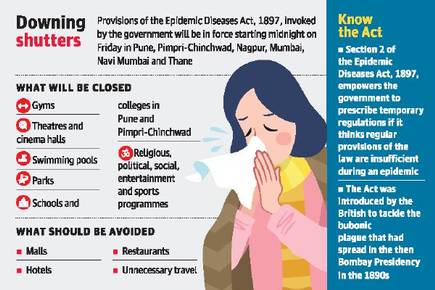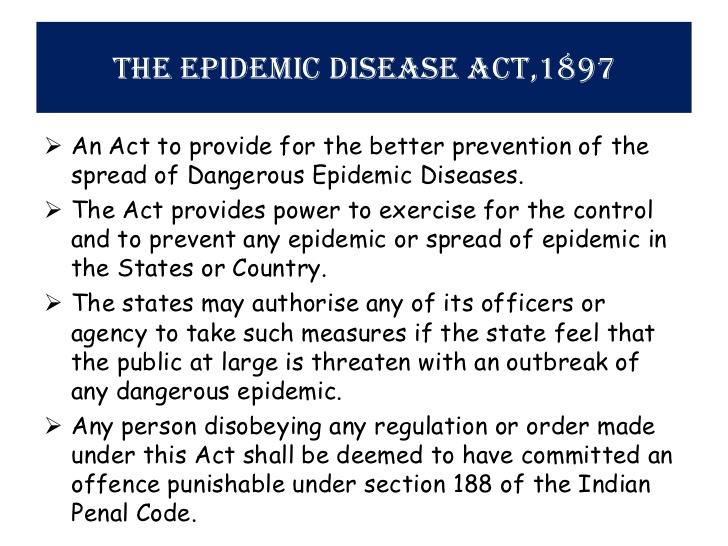Relevance: prelims/ Mains: Polity
Why in news?
- A High level Group of Ministers has decided that all States/UTs should be advised by Health Ministry to invoke provisions of Section 2 of Epidemic Disease Act, 1897 so that all advisories being issued from time to time by the Ministry of Health & Family Welfare/State/UTs are enforceable.
Key highlights:
- The Epidemic Act is meant “to provide for the better prevention of the spread of dangerous epidemic diseases”.
- Section 2 of the act empower the state government to take special measures and prescribe regulations as to dangerous epidemic disease.
- Section 2A of the Act empowers the central government to take steps to prevent the spread of an epidemic.
- According to section 3 of the act, Any person disobeying any regulation or order made under this Act shall be deemed to have committed an offence punishable under section 188 of the Indian Penal Code.
Background:
- The Epidemic Diseases Act is routinely enforced across the country for dealing with outbreaks of diseases such as swine flu, dengue, and cholera.
- The colonial government introduced the Act to tackle the epidemic of bubonic plague that had spread in the erstwhile Bombay Presidency in the 1890s.
- Using powers conferred by the Act, colonies authorities would search suspected plague cases in homes and among passengers, with forcible segregations, evacuations, and demolitions of infected places.
- Historians have criticised the Act for its potential for abuse.
- In 1897, the year the law was enforced, Lokmanya Tilak was punished with 18 months’ rigorous imprisonment after his newspapers Kesari and Mahratta admonished imperial authorities for their handling of the plague epidemic.
Provisions of the 1897 Epidemic Diseases Act
- The Act is one of the shortest Acts in India, comprising just four sections. It aims to provide for the better prevention of the spread of Dangerous Epidemic Diseases.
- The then Governor-General of colonial India had conferred special powers upon the local authorities to implement the measures necessary for the control of epidemics.
- Although, the act does define or give a description of a “dangerous epidemic disease”.
Its various sections can be summarized as under:
- The first section describes all the title and extent, the second part explains all the special powers given to the state government and centre to take special measures and regulations to contain the spread of disease.
- The second section has a special subsection 2A empowers the central government to take steps to prevent the spread of an epidemic, especially allowing the government to inspect any ship arriving or leaving any post and the power to detain any person intending to sail or arriving in the country.
- The third section describes the penalties for violating the regulations in accordance with Section 188 of the IPC. Section 3 states, “Six months’ imprisonment or 1,000 rupees fine or both could be charged out to the person who disobeys this Act.”
- The fourth and the last section deals with legal protection to implementing officers acting under the Act.
Examples of implementation
The act has been invoked several times since independence. Few recent incidents include-
- In 2018, the district collector of Gujarat’s Vadodara issued a notification under the Act declaring a town as cholera-affected.
- In 2009, to tackle the swine flu outbreak in Pune, Section 2 powers were used to open screening centres in civic hospitals across the city, and swine flu was declared a notifiable disease.
For more such notes, Articles, News & Views Join our Telegram Channel.
Click the link below to see the details about the UPSC –Civils courses offered by Triumph IAS. https://triumphias.com/pages-all-courses.php



